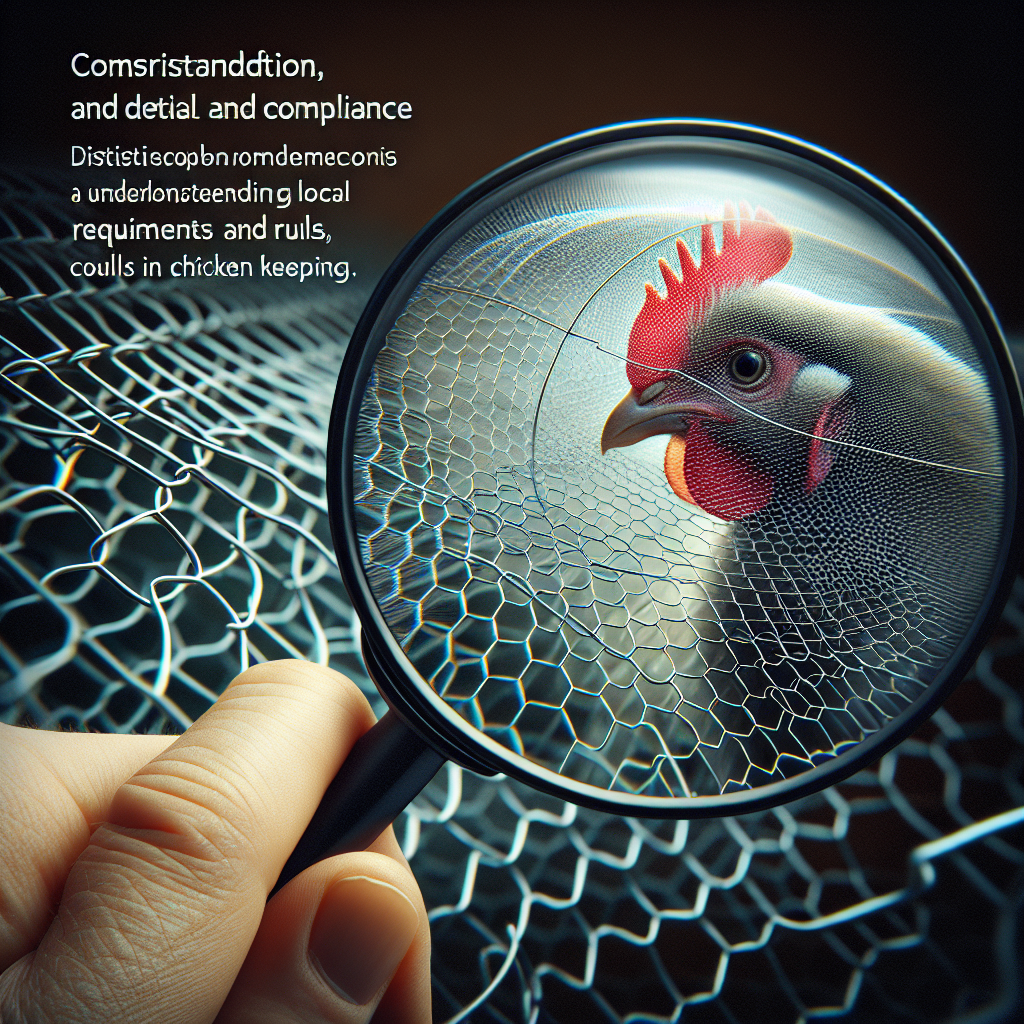As a beginner in the world of poultry farming, it is essential to understand how to monitor and maintain the health of your flock. Keeping a close eye on their well-being will not only ensure their overall health and happiness but also promote successful egg production. From observing their behavior and appearance to providing proper nutrition and hygiene, this article will guide you through the essential steps in keeping your feathered friends in prime condition. Let’s dive into the world of poultry care and learn how to keep your flock thriving!
Understanding the Basics
Identifying Common Health Issues
As a beginner raising a flock, it’s essential to familiarize yourself with common health issues that can affect your chickens. While chickens are generally hardy animals, they are still susceptible to various ailments. Some common health issues include respiratory infections, parasites, nutritional deficiencies, and injuries. By being aware of these common health problems, you can take proactive measures to prevent and address them promptly.
Learning about Flock Behavior
Understanding flock behavior is crucial for monitoring the health of your chickens. Chickens are social animals that have a hierarchical structure within their flock. By observing their interactions and behaviors, you can quickly identify any unusual or abnormal behavior that may indicate a health issue. For example, if a chicken isolates itself from the rest of the flock or demonstrates aggression, it could be a sign of stress or illness. By learning about flock behavior, you can intervene early and prevent potential health problems.
Setting up a Checklist for Monitoring
To effectively monitor the health of your flock, it’s helpful to establish a checklist that covers essential aspects of their well-being. This checklist should include daily observations such as their appetite, water intake, and overall behavior. Additionally, it should also include regular tasks like checking for injuries, inspecting their feathers and skin, and monitoring egg production. By having a checklist, you can ensure that you cover all necessary aspects of monitoring the health of your chickens and catch any potential problems early on.
Establishing a Regular Monitoring Schedule
Consistency is key when it comes to monitoring the health of your flock. Establishing a regular monitoring schedule will help you stay organized and ensure that you don’t miss any important observations or tasks. Depending on your flock size and your available time, you may choose to check on them once or twice a day. During these monitoring sessions, take the time to carefully observe their behavior, inspect their physical condition, and document any changes or concerns. A regular monitoring schedule will help you maintain a proactive approach to flock health.
Providing Proper Nutrition
Understanding the Nutritional Needs of Different Breeds
Different chicken breeds have varying nutritional needs, so it’s vital to understand the specific requirements of your flock. Proper nutrition is crucial for their overall health, growth, and egg production. Each breed has its own unique set of dietary needs, so research and consult with experts or breed-specific resources to determine the appropriate feeding regimen for your chickens. Understanding and fulfilling their nutritional needs will contribute significantly to their overall well-being.
Choosing the Right Feed
Choosing the right feed for your chickens is essential for maintaining their health. Commercially available chicken feeds are formulated to provide a balanced diet that meets their nutritional requirements. Look for reputable brands that offer feed specifically designed for the age and purpose of your chickens (e.g., starter feed for chicks, layer feed for egg-laying hens). Avoid feeding them cheap or low-quality feeds, as these may lack essential nutrients or contain harmful additives. Remember to also consider their access to fresh water at all times.
Ensuring a Balanced Diet
A balanced diet is crucial for the overall health and productivity of your chickens. In addition to providing a high-quality commercial feed, it’s important to supplement their diet with fresh greens, fruits, and vegetables. These additional food sources will not only provide essential vitamins and minerals but also stimulate natural foraging behaviors. Keep in mind that some food items can be toxic to chickens, so it’s important to research and provide safe and suitable options. By ensuring a balanced diet, you are equipping your chickens with the necessary nutrients for optimal health.
Supplementing with Vitamins and Minerals
Supplementing your chickens’ diet with vitamins and minerals can be beneficial, especially during certain life stages or conditions. Consult with a poultry nutritionist or veterinarian to determine if your flock requires any specific supplements. Common supplements include calcium for strong eggshells, vitamin D for strong bones, and electrolytes for hydration. However, it’s crucial not to over-supplement, as excessive amounts of certain vitamins or minerals can be harmful. Always follow professional advice and dosage recommendations when providing supplements to your flock.
Maintaining a Clean Environment
Importance of Cleanliness in Preventing Diseases
Maintaining a clean environment for your chickens is crucial for preventing the spread of diseases and parasites. Dirty and unsanitary conditions can lead to various health issues, including respiratory infections, bacterial infections, and parasites infestations. By prioritizing cleanliness, you can create a healthier environment for your flock and reduce the risk of illness. Cleaning the coop regularly, managing waste effectively, and controlling parasites are essential steps to maintaining a clean environment.
Regularly Cleaning the Coop
Regularly cleaning the coop is essential for the health and well-being of your flock. A dirty and unhygienic coop can harbor bacteria, parasites, and other pathogens that can cause disease. Establish a regular cleaning schedule, aiming to remove soiled bedding, droppings, and any debris at least once a week. Deep cleaning the coop periodically, disinfecting surfaces, and providing fresh bedding are also crucial steps to ensure a clean and healthy living environment for your chickens.
Proper Waste Management
Proper waste management is crucial for preventing disease transmission and maintaining a clean environment. Chicken manure contains pathogens and parasites that can survive for extended periods, posing a risk to the health of your flock. Implement a waste management system that involves regular removal of manure from the coop and proper disposal. Composting manure can be an eco-friendly option, but ensure that it reaches high temperatures to kill any potential pathogens. By effectively managing waste, you reduce the risk of disease and create a healthier living space for your chickens.
Controlling Parasites and Pests
Parasites and pests can compromise the health and well-being of your flock. They can cause irritation, stress, anemia, and even transmit diseases. Implementing a proactive parasite control program is essential to keep your chickens healthy. Regularly inspect your chickens for signs of parasites such as mites, lice, fleas, or ticks. Treatments can include dusting with appropriate powders or sprays, using natural deterrents, or seeking professional advice when necessary. Implementing proper biosecurity measures can also help prevent the introduction of parasites or pests to your flock.
Recognizing Signs of Illness
Observing Abnormal Behaviors
As a responsible flock owner, it’s important to be vigilant and observant when it comes to the behavior of your chickens. Changes in behavior can often be an indication of an underlying health issue. Be on the lookout for any abnormal behaviors, such as lethargy, excessive vocalization, reduced interaction with the flock, or unusual aggression. These changes may signal pain, discomfort, stress, or illness. By observing abnormal behaviors, you can take prompt action and seek appropriate veterinary care if necessary.
Identifying Physical Symptoms
Being able to identify physical symptoms in your chickens is crucial for early detection of health problems. Regularly inspect your flock for any noticeable changes in their physical appearance. Look out for symptoms such as changes in feather quality or loss, abnormal swelling or lumps, discharge from the eyes or nostrils, changes in skin color or texture, or lameness. These physical symptoms can provide clues about the underlying health condition of your chickens.
Noticing Changes in Feeding or Drinking Habits
Changes in feeding or drinking habits can indicate potential health issues in your flock. Monitor their appetite and water intake regularly and be attentive to sudden or significant changes. Reduced appetite, increased thirst, or refusal to eat or drink can be alarming signs. Similarly, changes in the consistency of droppings or abnormal colors can also be indications of health problems. By noticing these changes in their feeding and drinking habits, you can take appropriate measures to investigate and address any potential health concerns.
Monitoring Egg Production
For those raising chickens for egg production, monitoring egg production is an important aspect of flock health. A sudden decrease in egg production or the presence of abnormal eggs can indicate underlying health issues. Keep track of the number of eggs laid per day and note any deviations from their regular laying patterns. Additionally, inspect the quality of the eggs, such as shell integrity and size. Any significant changes in egg production or egg quality should warrant further investigation to ensure the health of your flock.
Implementing Preventive Measures
Vaccination and Immunization
Vaccination and immunization play a crucial role in preventing and controlling diseases in your flock. Consult with a poultry veterinarian to determine the appropriate vaccination program for your specific region and breed of chickens. Vaccines can protect your flock against common diseases such as Marek’s disease and avian influenza. Follow the recommended schedule and ensure that all vaccinations are administered correctly to maintain the health and well-being of your flock.
Biosecurity Measures
Biosecurity measures are essential for minimizing the risk of introducing diseases to your flock. Implementing biosecurity practices helps prevent the transmission of pathogens and reduces the likelihood of disease outbreaks. These practices may include limiting access to your property, controlling visitor and equipment entry, practicing proper hygiene, and maintaining strict quarantine protocols for new additions to your flock. By implementing biosecurity measures, you can significantly reduce the risk of introducing harmful pathogens to your chickens.
Quarantine for New Additions
When introducing new chickens to your existing flock, it’s crucial to implement a quarantine period. Quarantining new additions for a minimum of 30 days is recommended to observe for any signs of illness or disease. This practice allows you to prevent potential outbreaks and protect the health of your established flock. During the quarantine period, ensure that the new birds have a separate living space and do not come into direct contact with your existing chickens.
Maintaining Hygiene Practices
Maintaining good hygiene practices is key to minimizing the risk of disease transmission within your flock. Wash your hands thoroughly before and after handling chickens, particularly if you have been in contact with sick or potentially contaminated birds. Disinfect any equipment used for handling or feeding your chickens regularly. By prioritizing hygiene, you can significantly reduce the risk of disease transmission and maintain a healthy environment for your flock.
Seeking Professional Veterinary Care
Finding a Poultry Veterinarian
Establishing a relationship with a poultry veterinarian is invaluable for the health and well-being of your flock. Poultry veterinarians specialize in the care and treatment of chickens and can provide professional advice, diagnosis, and treatment options. Research local veterinary clinics or practices to find a veterinarian who is experienced in poultry medicine and has a good reputation among flock owners in your area.
Scheduling Regular Check-ups
Just like humans, chickens need regular check-ups to ensure their ongoing health and well-being. Schedule regular veterinary check-ups for your flock, following the recommended frequency based on their age, breed, and any specific health concerns. During these check-ups, the veterinarian will conduct a thorough physical examination, assess their overall health, and address any questions or concerns you may have.
Consulting for Diagnosis and Treatment
If you notice signs of illness or have concerns about the health of your flock, it’s important to consult your poultry veterinarian promptly. Early diagnosis and treatment are crucial for the successful management of health issues in chickens. Describe the symptoms or behavior changes you have observed, and provide any relevant information about your flock’s history and living conditions. This information will help your veterinarian make an accurate diagnosis and recommend appropriate treatment options.
Getting Professional Advice for Health Maintenance
Seeking professional advice for health maintenance is vital, especially as a beginner flock owner. Your poultry veterinarian can provide you with valuable guidance on various aspects of flock care. They can help you develop a personalized health maintenance plan, advise on appropriate feed and supplements, and educate you about common diseases and preventive measures. By seeking professional advice, you can ensure that you are taking the necessary steps to maintain the health and longevity of your flock.
Understanding Common Diseases
Avian Influenza
Avian influenza, also known as bird flu, is a highly contagious viral disease that affects birds. It can cause severe illness and high mortality rates in infected flocks. Avian influenza is primarily spread through direct contact with infected birds or through contaminated surfaces. Symptoms may include respiratory distress, coughing, sneezing, decreased egg production, and high mortality rates. It’s important to maintain strict biosecurity measures and follow vaccination protocols to prevent and control avian influenza in your flock.
Newcastle Disease
Newcastle disease is a highly contagious viral disease that affects a wide range of birds, including chickens. It can cause respiratory distress, diarrhea, nervous system disorders, and high mortality rates. Newcastle disease is primarily spread through direct contact with infected birds or their excretions. Strict biosecurity measures, proper vaccination, and timely veterinary care are essential for the prevention and control of Newcastle disease.
Coccidiosis
Coccidiosis is a parasitic disease caused by various species of coccidian protozoa. It primarily affects the intestines of chickens and can cause diarrhea, weight loss, and reduced growth rates. Coccidia oocysts are shed in the feces and can contaminate the environment, leading to the infection of other chickens. Proper sanitation, effective waste management, and regular use of anticoccidial medications or vaccines can help prevent and control coccidiosis in your flock.
Marek’s Disease
Marek’s disease is a highly contagious viral disease that affects chickens, causing tumors and nervous system disorders. It can lead to significant economic losses in poultry production. Marek’s disease spreads through the shedding of infected feather dander from carrier birds. Symptoms may include paralysis, weight loss, and tumors in various organs. Strict biosecurity measures, vaccination, and maintaining a clean environment can help prevent and control Marek’s disease.
Handling Injuries and Emergencies
Preparing a First Aid Kit
Being prepared for injuries and emergencies is essential when raising a flock of chickens. Prepare a well-stocked first aid kit that includes essential supplies such as clean gauze, bandages, antiseptic solution, poultry wound spray, styptic powder, and a pair of tweezers. Familiarize yourself with basic first aid techniques for chickens and keep emergency contact information for your poultry veterinarian readily available.
Treating Minor Wounds
Minor wounds are bound to occur when raising chickens. Clean any minor wounds with an appropriate antiseptic solution, and apply a poultry wound spray to prevent infection. Cover the wound with a clean bandage or gauze pad and secure it in place if necessary. Monitor the wound for signs of infection and consult your veterinarian if healing does not progress as expected.
Dealing with Broken Bones or Fractures
Dealing with broken bones or fractures in chickens can be challenging. If you suspect a broken bone or fracture, immobilize the affected area using a splint or wrap made of a lightweight and non-constrictive material. Ensure that the bird is comfortable, with access to food and water. Contact your veterinarian immediately for further guidance and veterinary care. Broken bones or fractures often require professional treatment to ensure proper healing and minimize long-term complications.
Knowing When to Seek Emergency Veterinary Care
In some cases, emergencies may arise that require immediate veterinary care. Timely intervention can be crucial for the successful treatment and recovery of your chickens. If your chicken experiences severe injuries, excessive bleeding, respiratory distress, or any life-threatening symptoms, seek emergency veterinary care without delay. Keep the contact information of an emergency avian veterinarian readily available for quick access in such situations.
Managing Stress and Behavior
Recognizing Stressors in the Environment
Stress can significantly impact the health and well-being of your flock. Recognizing common stressors in the environment is essential for managing their overall stress levels. Common stressors may include loud noises, predator threats, extreme weather conditions, overcrowding, or sudden changes in the environment. By identifying and minimizing these stressors, you can help maintain a calmer and healthier flock.
Implementing Stress-Reducing Strategies
Implementing stress-reducing strategies can help alleviate the negative effects of stress on your flock. Provide a safe and secure environment, ensuring that the coop is predator-proof and comfortable. Offer appropriate environmental enrichment, such as perches, dust baths, and toys, to encourage natural behaviors and reduce boredom. Keep a consistent daily routine to help minimize unnecessary stress and disturbances.
Addressing Aggression and Pecking Order Issues
Aggression and pecking order issues can sometimes arise within a flock, particularly when introducing new birds or during times of stress. It’s important to address these issues promptly to maintain harmony and minimize injuries. Provide sufficient space and resources to reduce competition, and monitor the flock for any signs of excessive aggression or bullying. If necessary, separate aggressive birds or seek advice from a poultry behavior specialist.
Promoting Positive Flock Dynamics
Promoting positive flock dynamics is key to maintaining a harmonious and healthy group of chickens. Encourage positive social interactions by providing ample space, perches, and places for chickens to retreat or hide if needed. Avoid overcrowding, as it can lead to stress and aggression. By creating an environment that facilitates positive flock dynamics, you can promote a healthier and happier group of chickens.
Documenting and Tracking Health Records
Maintaining a Health Journal
Maintaining a health journal for your flock is a valuable practice as it allows you to track important details and observations over time. In your health journal, record daily monitoring observations, such as behavior, appetite, and water consumption. Document any concerns, symptoms, treatments provided, vaccinations administered, and any notable changes in egg production. Regularly reviewing your health journal can help identify trends, patterns, or potential health issues that require further attention.
Recording Observations and Treatments
Recording observations and treatments for specific health incidents is essential for accurate health tracking. In addition to your health journal, maintain detailed records for any specific health issues or treatments your chickens may have experienced. Include dates, symptoms, diagnostic test results, treatment protocols, and outcomes. These records will assist you and your veterinarian in making informed decisions and assessing the effectiveness of treatments in the future.
Documenting Vaccinations and Medications
Keeping thorough records of vaccinations and medications administered to your flock is essential for disease prevention and control purposes. Maintain a vaccination and medication log that includes the type of vaccine or medication, the date of administration, the dosage given, and the method of administration. This documentation will help you ensure that your flock stays up to date with preventative measures and allows you to refer back to specific details when needed.
Tracking Long-term Health Patterns
Tracking long-term health patterns is crucial for assessing the overall well-being of your flock. By monitoring trends and patterns over time, you can identify any recurring health issues or changes that require attention. Keep records of your flock’s growth rates, egg production, and any major health events. This information will provide valuable insights into the long-term health and productivity of your flock and enable you to make informed decisions based on historical data.
In conclusion, monitoring and maintaining the health of your flock as a beginner requires a proactive and holistic approach. By understanding the basics, providing proper nutrition, maintaining a clean environment, recognizing signs of illness, implementing preventive measures, seeking professional veterinary care, and documenting health records, you can effectively promote the well-being and longevity of your feathered friends. Remember, regular observation, care, and attention to their health needs will go a long way in ensuring a happy and healthy flock.




